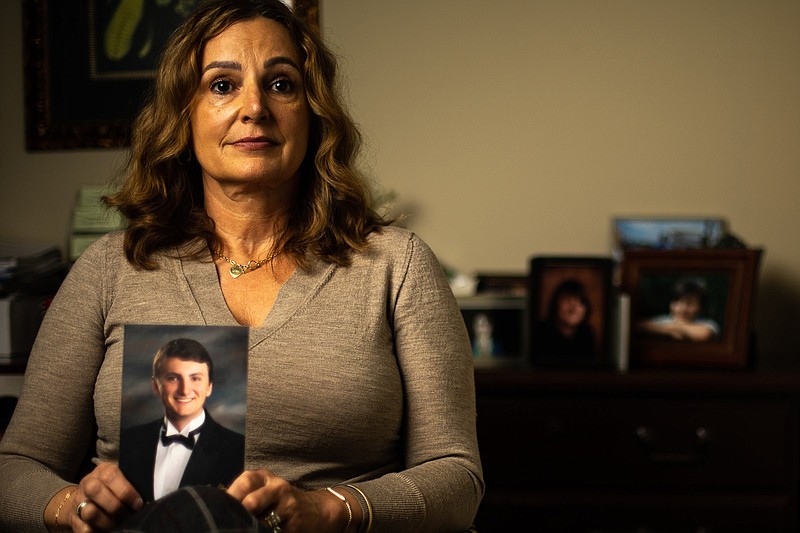With the number of deaths by overdose in the U.S. now reaching a grim milestone - topping an all-time high of 100,000 in a 12-month period - data in Tennessee and Hamilton County show an even more alarming trend.
Overdose deaths nationwide grew by 28.5% in the 12 months ending April 2021, compared to the same period a year earlier.
Tennessee's rose by 50.1% during the same period, the fifth-largest increase in the nation, according to estimates in a Wednesday report by the federal Centers for Disease Control and Prevention.
Meanwhile, Hamilton County suffered 151 overdose deaths in the 12 months ending March 2021, the latest data available. That's a 61% increase over the same period a year earlier, when the county saw 94 overdose deaths.
(READ MORE: US overdose deaths topped 100,000 in one year, officials say)
But the numbers don't tell the entire story. It's important to remember that behind each statistic is a person and the loved ones left behind - like Lisa Jarvis of Chattanooga, whose 24-year-old son Logan Jarvis died on July 16.
Lisa Jarvis said her journey with her son and his addiction was heart-breaking and eye-opening.
"I have no guilt where Logan is concerned," she said. "I am not ashamed of him - they [addicts] deserve our help and support."
Experts attribute some of the large increases in overdose deaths to the pandemic, as so many Americans have had to deal with isolation as a result of social distancing and other attempts to curb the spread of COVID-19.
"The pandemic can be really hard," said Martha Law, lead therapist at the Chattanooga Recovery Center.
Since opening its doors on July 28, 2020, the drug addiction treatment center has helped 177 patients.
"We didn't have the face-to-face meetings, the in-person connection that we have in that community, and that made a big impact in people's recovery," she said. "So much of what we do in mental health treatment or substance abuse treatment is about, 'Are your thoughts helping you or hurting you?' And if you're isolated, you don't have people to talk to, you don't have that person to bounce these thoughts off of."
Despite the difficulties the pandemic may present for people looking for help in dealing with addiction, experts said following through is incredibly important.
Between 68 and 73 percent of addicts have a chance of making it to five or 10 years of sobriety, "as long as they regularly engage in a program for at least the first year of their recovery," said Paul Fuchcar, executive director of the Chattanooga-based Council for Alcohol and Drug Abuse Services.
Fighting stigma
Lisa Jarvis knows all too well that there's no shame in seeking help. Through her journey with her son's addiction, she had to push back against the stigma surrounding those struggling to get clean.
"You know how closed-minded people think," she said. "You know, 'An addict has to be in the street,' or you know, 'Nobody cares about them.' It's not true," Jarvis said. "I very much learned through our experience that addiction can hit anybody."
An only child, Logan Jarvis was close to his parents, his mother said. His father was his best friend, and she was his confidant. They'd frequently take trips together and go to New York. While there, they'd make sure to see a play because her son had a passion for the theater. He had a great talent for writing and was encouraged to pursue a career in it by his high school counselor. He later enrolled at Chattanooga State Community College and transferred to the University of Tennessee but lost interest, she said.
"He was super intelligent, had a very inquisitive mind. He was into conspiracy theories, podcasts, he liked to have fun and goof around with his family," Jarvis said. "At the holiday parties, after we would eat, the music would start, and we would just dance and have a good time. We had some great vacations together."
Overdose deaths
Deaths of Americans by overdose grew by 28.5% between the 12 months ending April 2020 and the 12 months ending April 2021. These five states saw the nation’s largest increases:State, 2020 total, 2021 total, Percentage change1. Vermont, 123, 209, 69.9%2. West Virginia, 991, 1,607, 62.2%3. Kentucky, 1,501, 2,319, 54.5%4. Louisiana, 1,463, 2,218, 51.5%5. Tennessee, 2,385, 3,581, 50.1%Source: U.S. Centers for Disease Control and Prevention’s National Center for Health Statistics
(READ MORE: COVID-19 grant supports training as overdoses spike in Chattanooga)
Throughout his life, Logan Jarvis struggled with self-esteem issues, and while seeking help at one rehabilitation center he was diagnosed with depression.
Lisa Jarvis said her son began smoking marijuana at age 14 and was expelled from school after being caught smoking on campus.
His sophomore year of high school, he was enrolled in a private school, where he appeared to thrive. He loved being a part of the theater group, made friends and maintained good grades.
By his second semester, however, Logan told his mother that a friend had begun providing him Xanax.
By the time he was 22, Lisa Jarvis learned that he was using cocaine and meth. He was also drinking heavily, she said. Soon after, he began to use heroin.
For the most part, Logan was able to keep a job and be a functioning member of society, his mother said. It wasn't until he overdosed during a shift as a manager at a local restaurant that things began to take a turn for the worse.
"He was really vague about the details, but he told me that he was found unconscious in the bathroom of [the restaurant] and someone was able to bring him to," Lisa Jarvis said.
Logan Jarvis overdosed for the second time in May in a parking lot.
The night that her son died, his mother remembers he seemed normal. He had gone out for a few hours and when he came back he spent time with his family before taking a plate of food to his room.
Soon after, Logan Jarvis' parents discovered his lifeless body in the bathroom. He died when he thought he was taking meth and it turned out to be the much more deadly fentanyl, a medical examiner's report found.
"I want people to know that whether it's their own child or someone else's child, that addiction is a disease, it's not something that people choose," Jarvis said. "It's a mental illness, it's just a disease just like cancer, would we allow someone who has cancer to kill themselves or would we do anything to help heal them?"
Contact La Shawn Pagan at lpagan@timesfreepress.com or 423-757-6476.

